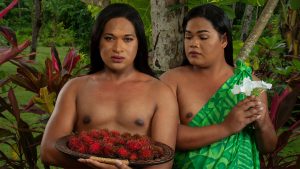Yuki Kihara
Paradise Camp
New Zealand Pavilion at the Venice Biennale
April 23–November 27, 2022
Creative New Zealand announces details of the New Zealand Pavilion at the 59th Venice Biennale.
Small island ecologies, queer rights, intersectionality and decolonisation are all explored by artist Yuki Kihara in her Venice Biennale 2022 project Paradise Camp, curated by Professor Natalie King. The pavilion will be located at a central space in the Arsenale.
Yuki Kihara is renowned for delving into the complexities of postcolonial histories in the Pacific and interrogating Western misinterpretations from the perspective of the Fa’afafine (Sāmoan for “in the manner of a woman”, Sāmoa’s third gender) community, to which she belongs. Kihara’s exhibition for Venice will be told through this unique lens, drawing attention to often untold, marginalised histories and issues facing her community.
As the first artist from New Zealand to present at the Biennale Arte who is Pasifika, Asian and Fa’afafine, Kihara explores Sāmoa-New Zealand relations from a Fa’afafine perspective, highlighting key issues around New Zealand’s ongoing social, political and cultural engagement with the Pacific. Incorporating archival research, photography, video and socially engaged methods Paradise Camp eloquently and provocatively investigates a range of critical issues that impact Fa’afafine people’s lives, including the intertwinements of colonisation, intersectionality and climate catastrophe. Paradise Camp will be shown for the first time in Venice and comprises photographs, video and archive material featuring a local cast and crew of over 80 people. The filming and photography took place on Upolu Island, Sāmoa.
Yuki Kihara explains, “My presentation to the New Zealand Pavilion at the International Art Exhibition – Venice Biennale is intended to camp the notion of paradise, adding the Pasifika Indigenous into drag to create a new term In-drag-enous. I am grateful to my community for sharing in the making of the project and can’t wait to present my work at Venice.”
Chantal Spitz, Mā’ohi/Tahitian author and member of Paradise Camp Advisory Council comments, “Yuki Kihara’s grass-roots and socially-engaged project invites us to wander through a gracious and sparkling alternative reading of the world. As a member of the Advisory Council, I am delighted that Yuki’s insightful viewpoint is being presented at the New Zealand Pavilion at the 59th International Art Exhibion – Venice Biennale. As well as shining a light on the Faʻafafine community, Paradise Camp reveals a wider Pasifika and Samoan world view on Western art history.”
Curator Natalie King comments, “Paradise Camp is an ensemble exhibition conceived for the New Zealand Pavilion at the Biennale Arte 2022. Kihara narrates stories of invasion and prejudice and in so doing takes the tempo of our times by unravelling colonial histories linked with gender politics and environmental concerns.”
Caren Rangi, Commissioner of New Zealand’s pavilion at the Biennale Arte 2022 and Chair of the Arts Council of New Zealand Toi Aotearoa says, “Not only as the Commissioner and Arts Council Chair, but as a Cook Islands woman, Paradise Camp holds a special place in my heart. It’s a privilege to support an artist who is continually shining light in our Pasifika arts community and illuminating alternative voices through a focus on her homeland Sāmoa.”
The New Zealand at Venice team is proud to have curator and arts writer Ioana Gordon-Smith as Assistant Pasifika Curator of Paradise Camp. Ioana’s role is supported through Creative New Zealand’s Pacific Arts Strategy 2018-2023.
New Zealand has exhibited at the Biennale Arte since 2001. New Zealand artists who have exhibited are: Jacqueline Fraser and Peter Robinson (2001); Michael Stevenson (2003) et al.(2005); Judy Millar and Francis Upritchard (2009); Michael Parekowhai (2011); Bill Culbert (2013); Simon Denny (2015); Lisa Reihana (2017) and Dane Mitchell (2019).


